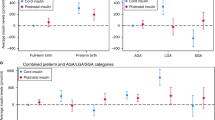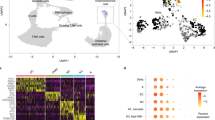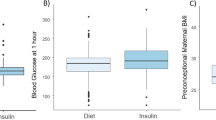Abstract
Summary: Maternal and fetal serum insulin response to glucose, leucine and leucine plus glucose was examined by infusions to normal pregnant women at term immediately before cesarean section. the maternal infusion of glucose (50 g) for 30 or 60 minutes was associated with a marked hyperglycemis and with a rise in serum insulin in mother and fetus. the fetal insulin response to the administration of glucose for 60 minutes was higher (p < 0.01) than when the same dose was given for 30 minutes, while the blood glucose was lower (p < 0.01). The maternal infusion of a smaller dose of glucose (25 g) or leucine (15 g) for 60 minutes produced an increase in serum insulin only in the mothers. However the simultaneous administration of these substances stimulated maternal and fetal insulin secretion. The fetal insulin level produced was similar to that seen after the maternal infusion of 50 g of glucose for 60 minutes. While the cord blood glucose was slightly higher but significantly different (p < 0.01) than that seen in the saline infused group.
Speculation: It is suggested that amino acids with glucose regulate fetal insulin secretion.
Glucose rapidly crosses the placents in the presence of a concentration gradient between mother and fetus and it has been suggested that fetal plasma glucose in controlled indirectly via the maternal endocrine system (3). Insulin is present in the fetal pancreas as early as the 10th gestational week and in fetal plasma from the 12th week (15, 17, 20). the insulin is of fetal origin since the human placenta is either impermeable or the amount transferred is physiologically insigificant (18). However, little information is avilable regarding the development of the mechanisms that control its secretion by the fetal beta cells or its physiological effects. Studies have demonstrated that early in gestation (12 to 20 weeks) fetal insulin response to meternal hyperglycemia is neglegible (15). By term the fetus in utero is capable of responding to meternal hyperglycemia with an elevation of serum insulin, though the responses are attenuated compared with those of adults (15).
The object of the present study is to provide evidence that some aminoacids, such as leucine, with glucose may contribute to the regulation of fetal insulin secretion. Twenty-five grams of glucase was infused with leucine to normal mothers just before cesarean section to increase cord blood glucose slightly. Blood glucose and serum insulin were determined in maternal blood during and after the infusion and in the fetus at birth. Furthermore, fetal cord blood glucose and serum insulin response to this meternal infusion were compared with those of the maternal administration of 50 g of glucose for 30 or 60 minutes.
Similar content being viewed by others
Log in or create a free account to read this content
Gain free access to this article, as well as selected content from this journal and more on nature.com
or
Author information
Authors and Affiliations
Rights and permissions
About this article
Cite this article
Grasso, S., Palumbo, G., Rugolo, S. et al. Human Fetal Insulin Secretion in Response to Maternal Glucose and Leucine Administration. Pediatr Res 14, 782–783 (1980). https://doi.org/10.1203/00006450-198005000-00016
Issue date:
DOI: https://doi.org/10.1203/00006450-198005000-00016
This article is cited by
-
Neonatal hypoglycemia following maternal glucose infusion prior to delivery
The Indian Journal of Pediatrics (1991)



